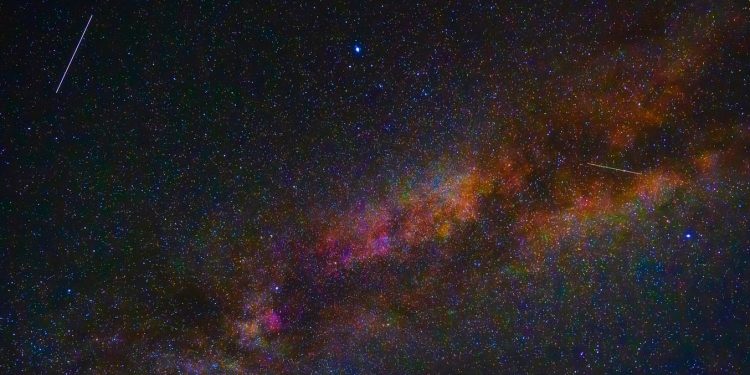The expansion of Elon Musk’s Starlink satellite network is raising concerns among astronomers, who argue that these satellites are not only cluttering Earth’s orbit but also increasingly interfering with vital scientific observations.
Starlink’s Impact on Radio Astronomy
According to the Netherlands Institute for Radio Astronomy (ASTRON), the newest generation of SpaceX’s Starlink satellites is emitting stronger signals that disrupt radio telescopes. These satellites operate at higher frequencies, creating significant interference for sensitive radio equipment used to observe the universe.
“With each launch of these satellites, we lose more of the sky,” says Jessica Dempsey, director of ASTRON, in an interview with the BBC. She and her team recently published a study in Astronomy & Astrophysics, revealing that the latest Starlink satellites emit over 30 times more radio interference than previous generations. This exceeds the levels recommended by the International Telecommunications Union, raising concerns about the long-term impact on space research.
Radio telescopes like ASTRON’s Low-Frequency Array (LOFAR) are essential for studying the universe beyond the reach of traditional optical telescopes. These instruments allow scientists to explore phenomena like the jets emitted from black holes, study early galaxies, and search for exoplanets. However, the increasing presence of Starlink satellites is complicating their efforts.
Lead author Cees Bassa explained in a press release that radiation from Starlink satellites is significantly brighter than the faint astrophysical sources they aim to observe. “The electromagnetic radiation from Starlink is about 10 million times brighter than what we usually detect,” Bassa noted. “It’s like comparing the faintest star visible to the naked eye with the brightness of the full moon.”
Astronomers have voiced their concerns to SpaceX for years, even before the launch of Starlink’s second generation of satellites, which began orbiting Earth in early 2023. However, these concerns appear to have gone largely unaddressed.
SpaceX is now launching about 40 second-generation Starlink satellites each week, with no sign of slowing down. “As more and more of these satellites are sent into orbit, the problem only worsens,” Bassa added.
Future Implications for Space Research
The implications of this issue are far-reaching. If the interference from Starlink and other satellite networks continues to grow, it could severely hamper humanity’s ability to study the cosmos. ASTRON researchers fear that without stricter regulations and solutions to mitigate radio frequency emissions, future generations of scientists may struggle to make groundbreaking discoveries in fields like black hole research, galaxy formation, and planetary science.
The debate surrounding satellite networks like Starlink touches on broader questions about balancing technological progress with the preservation of essential scientific research. While satellite internet can provide global connectivity, it also threatens to blind astronomers to the mysteries of the universe.
What do you think the solution is? Should governments and private companies work together to create more stringent regulations? Let us know your thoughts in the comments!
As the launch of Starlink satellites continues, the scientific community will likely push for more significant discussions about the long-term impact of space commercialization on research. There are already calls for stronger regulations to protect vital astronomical data. The question remains whether SpaceX and other private companies will listen.
What steps can be taken to protect radio astronomy while maintaining the benefits of satellite technology? This is a debate that will shape the future of both space exploration and scientific discovery.
By framing this issue in a broader context and keeping the narrative human-centered, it’s clear the challenge posed by Starlink is more than just a technological inconvenience. It’s a potential threat to humanity’s ability to understand the universe—something that impacts us all.
Join the Conversation!
Have something to share or discuss? Connect with us on Facebook and join like-minded explorers in our Telegram group. For the latest discoveries and insights, make sure to follow us on Google News.











